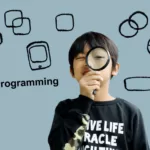Just as kids of past generations were taught handwriting and arithmetic, the children of today are being introduced to coding at a very young age. Coding has become an integral skill in our rapidly advancing technological world. As coding increases in popularity and relevance, so do the coding misconceptions surrounding kids. It is essential to debunk these myths to foster a more supportive coding environment for young learners.
Misconception 1: Coding is too difficult for kids
Perhaps one of the most common coding misconceptions, it is often believed that coding is inherently too complex for young children to comprehend. However, children are able to pick up a second language more naturally than adults. Children’s brains are hardwired for learning, make early exposure beneficial. As such, children are more than capable of understanding coding; they may be more capable of learning than their parents.
Platforms like Scratch, Tynker, and Code.org offer interactive, game-like experiences where kids can learn basic programming concepts without diving into complicated syntax. The process is playful, enjoyable, and tailored to their learning needs.
Misconception 2: You need to be good at math to code
While math and coding share logical thinking components, children do not need knowledge of advanced mathematics to start coding. Basic arithmetic is more than enough for beginner’s programming. As you delve deeper into the world of programming and begin exploring areas such as algorithms and data science, you will need advanced math skills. However, the foundation of coding, especially for children, is about problem-solving and logical thinking than complex equations.
Misconception 3: Coding isn't creative
Picture a programmer. A stereotypical image of a programmer typing away in a dark room wearing a hooded sweatshirt may arise. The reality? Coding is incredibly creative! Coding is about building, designing, and innovating. When kids code, they are not just putting together lines and blocks of commands; they are melding together logic with imagination.
Misconception 4: Girls aren’t as interested or as good at coding as boys
This one is a particularly dangerous and detrimental myth. Unfortunately, societal stereotypes, biases, and gender norms have perpetuated this myth. Without a doubt, girls are just as capable as boys when it comes to coding. Initiatives like “Girls Who Code” exist precisely to combat this misconception, proving that coding knows no gender boundaries. When girls are included and encouraged, given the same opportunities as boys, they excel just as well in the field.
Misconception 5: Coding isn’t a valuable skill unless you want to become a programmer
Coding isn’t just for future software engineers. It’s a literacy in the digital age. Knowing how software works, even on a basic level, is invaluable in many fields, from business to art. By learning to code, kids develop skills like logical thinking, problem-solving, and perseverance. These skills are transferable and highly beneficial, regardless of one’s future career.
Misconception 6: Kids will get addicted to screens if they start coding
It is essential to differentiate between passive screen time (like mindlessly watching endless hours of videos on YouTube) and active screen time (where they’re engaging, learning, and creating). Coding clearly falls into the latter category. While it is always a good idea to monitor and limit overall screen time, as well as ensure online safety for children, coding sessions can be as educational and beneficial as reading a book or practicing a musical instrument.
Misconception 7: All coding tools and platforms are the same
Coding platforms for kids vary widely in terms of content, interface, learning outcomes, and difficulty. Some platforms are visual-based, while others introduce text-based coding early on. Depending on your child’s age, interests, and previous experience, one platform might be more suitable than another. It’s essential to research and find a platform that aligns with the child’s learning journey.
Misconception 8: Early success in coding means my child is a prodigy
While it’s thrilling to see your child excel in coding, it’s essential to have balanced expectations. Just as with any skill, initial success doesn’t necessarily predict future expertise. It’s more crucial to focus on nurturing their curiosity and love for learning rather than labeling them or placing undue pressure.
Misconception 9: If my child doesn't take to coding instantly, it's not for them
Not every child will instantly fall in love with coding, and that’s okay. Like any skill, it requires patience, practice, and time. Sometimes, a child might not connect with one particular platform or teaching method. It’s worth exploring different resources or taking breaks and revisiting it later.
Breaking Coding Misconceptions
As coding education becomes increasingly prevalent, understanding and debunking these coding misconceptions is vital. Kids are innately curious and adaptive, making them great candidates for learning coding. By supporting and guiding them without biases or preconceived notions, we can pave the way for a generation of logical thinkers, problem solvers, and creative innovators. Whether they choose a career in programming or apply these skills elsewhere, the foundational abilities they gain from coding will undoubtedly serve them well.






